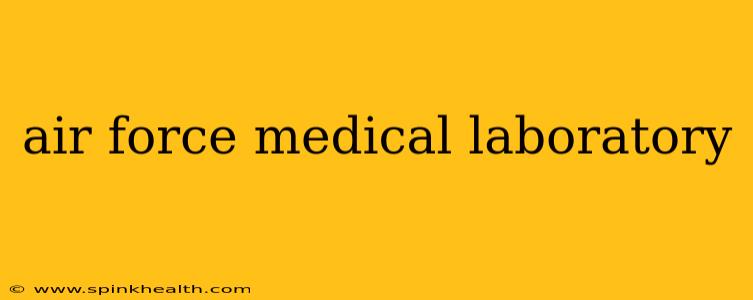The whirring of centrifuges, the quiet hum of sophisticated equipment, the hushed concentration of scientists – this is the world of the Air Force Medical Service (AFMS) laboratories. These aren't just any labs; they're the unsung heroes behind the health and readiness of our airmen and women, ensuring they're fit to fly, fight, and win. Their work stretches far beyond routine blood tests; it involves cutting-edge research, rapid diagnostics, and a constant pursuit of excellence in military healthcare. Let's delve into the fascinating world of Air Force medical laboratories.
What Does an Air Force Medical Laboratory Do?
The work of an Air Force medical laboratory is incredibly diverse. It's not just about analyzing blood samples; it encompasses a vast array of responsibilities crucial to maintaining the health and operational readiness of the Air Force. Think of them as the vital diagnostic arm of the AFMS, providing critical information that guides treatment decisions and ensures the well-being of personnel deployed worldwide.
This includes:
- Clinical laboratory testing: This is the bread and butter of these labs, encompassing hematology (blood cell analysis), clinical chemistry (analyzing blood components), microbiology (identifying infectious agents), immunology (detecting antibodies and immune responses), and blood banking (processing and storing blood for transfusions).
- Public health surveillance: These labs play a crucial role in monitoring and preventing outbreaks of infectious diseases within the Air Force population. They analyze samples, track trends, and advise on preventative measures.
- Research and development: Air Force medical laboratories are at the forefront of medical research, developing new diagnostic techniques, treatments, and preventative strategies tailored to the unique challenges faced by airmen and women.
- Operational medicine support: Deploying alongside airmen, these labs provide rapid diagnostics in remote or challenging environments, ensuring quick and effective treatment of injuries and illnesses.
- Aerospace medicine: This specialized area focuses on the unique health challenges posed by flight, including altitude sickness, decompression sickness, and the effects of radiation exposure.
What Kind of Tests Do Air Force Medical Labs Perform?
The range of tests conducted in Air Force medical labs is extensive, mirroring the complexity of human health. They perform standard tests like complete blood counts (CBCs) and comprehensive metabolic panels (CMPs), but also delve into specialized areas like:
- Molecular diagnostics: Identifying infectious agents such as viruses and bacteria through genetic analysis.
- Parasitology: Detecting parasitic infections prevalent in certain deployment locations.
- Toxicology: Identifying and quantifying exposure to harmful substances.
How Do I Become a Medical Laboratory Technician in the Air Force?
Many paths lead to becoming a Medical Laboratory Technician (MLT) in the Air Force. The most common is enlisting as an Airman, and undergoing specialized training at the Air Force’s medical training facilities. A background in biology or related sciences can be beneficial. Dedication, precision, and attention to detail are crucial for success in this demanding field.
What are the Job Responsibilities of an Air Force Medical Laboratory Technician?
An Air Force MLT's daily tasks can vary, but generally include:
- Collecting and preparing samples: This involves accurately labeling, processing, and storing specimens.
- Performing laboratory tests: Utilizing sophisticated equipment and following strict protocols.
- Analyzing results: Interpreting data and generating accurate reports.
- Maintaining equipment: Ensuring that laboratory equipment is functioning properly.
- Adhering to safety regulations: Maintaining a sterile and safe working environment.
What is the Career Progression for a Medical Lab Technician in the Air Force?
The career path for an Air Force MLT offers opportunities for advancement. With experience and additional training, one can advance to supervisory roles, specialize in particular areas of laboratory medicine, or pursue further education for even greater career opportunities within the AFMS.
The Air Force medical laboratories are a testament to the dedication and expertise within the AFMS, ensuring the health and readiness of our nation's airmen and women, both at home and abroad. Their contributions are vital, ensuring that the brave men and women serving our country are equipped to face any challenge.

